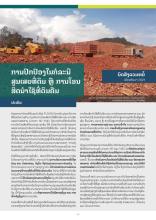Land Library
Welcome to the Land Portal Library. Explore our vast collection of open-access resources (over 74,000) including reports, journal articles, research papers, peer-reviewed publications, legal documents, videos and much more.
/ library resources
Showing items 73 through 81 of 4605.This list of bibliographic references is an accompanying piece to the data story written by Rick de Satgé and published by the Land Portal on 28 April 2022.
This is the PDF version of an online data story published by Land Portal on 28 April 2022.
The ongoing use of landscape-based conflict commodities — diamonds and other minerals, timber, wildlife, etc. — to finance wars continues to evolve.
The RGIL project is part of the Global Programme Responsible Land Policy (GPRLP) and is implemented in Ethiopia, Laos and Uganda.
Through a collaborative process with the Land Law Advisory Group in Laos, this series of briefing notes addresses some of the most pressing issues in the country in relation to the recently passed Land Law (2019) and Forest Law (2019).
Land consolidation is a highly effective land management instrument that allows for the improvement of the structure of agricultural holdings and farms in a country, which increases their economic and social efficiency and brings benefits both to right holders as well as to society in general.
Land consolidation is an instrument that readjusts land parcel shapes and reallocates land rights in order to minimize farmland fragmentation, optimize agricultural output, and generate optimal living and working conditions in rural areas.
China’s rural industrialization, which flourished in the 1980s, has suddenly declined since the mid-1990s. Based on the perspective of institutional change of rural collective construction land, this paper discusses the reasons behind the rise and fall of China’s rural industrialization.
Access to land is crucial for food systems to address the challenges caused by habitat and biodiversity loss, land and water degradation, and greenhouse gas emissions. Sustainable food production requires land security upstream for agricultural production.








